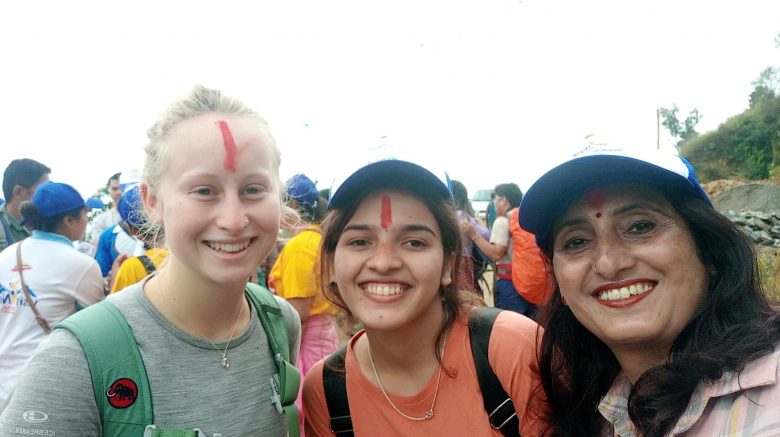Why do I have to pay a registration fee?
The registration fees goes towards the running of the organization (office space, staff, computers, email/internet and stationery). Future Nepal has a central office in Kathmandu and a branch office in Chitwan. We are currently sponsoring some orphanage and deprived children; part of the fee goes towards costs for these children’s education and clothes.
What kind of volunteers is Future Nepal looking for?
Future Nepal has worked with universities and colleges, organizations, clubs, church groups, youth groups and individuals. You do not need any specialized training to work with us. We will provide you with appropriate training for your program, although experience in teaching, health work or environmental project can be advantage.
When should I arrive in Nepal?
We are very flexible and as such you can arrive at a date which is best suited to your needs. You are welcome to arrive a few days earlier than the start of your program. Our representative will meet you at the airport holding a sign with your name. He will take you to the hotel. We can arrange your accommodation if you arrive a couple of days earlier, but you will need to pay the costs for the extra time yourself, and for any non-Future Nepal activities. In some cases, the dates of your program can be adapted if you contact us.
I meet any Future Nepal staff at the airport?
Yes, one of our representatives will meet you at the airport to pick you up holding a sign with your name.
Where will I be staying during my training period?
During your training period, you will be in Guest House in Thamel, Kathmandu.
How much money do I need?
Upon your arrival in Kathmandu you can get a room for $20- $30 a night, regular food for about $15 to $25 a day. Transportation is relatively inexpensive too. We recommend that you purchase the Lonely Planet guide to Nepal. The travel guide for Nepal will help you estimate how much money you may need.(Remember that you need money for your visa and your flight tickets as well.)
Where will I be placed?
After we receive your flight confirmation we will find suitable placement for you.
What kinds of thing do I need to bring with me?
Sleeping bag
Hiking boots
Flip-flops
Fleece jacket (during winter months)
Sun cream
Mosquito net/repellent
Water purification tablets and water filter
Photos of your family/ friends
A few examples of your local currency
Music
National flag
Colored pencils, pens, drawing books, grammar books, charity donation t-shirts
Flashlight
Penknife
First aid kit
Is there age limit in program?
No.
What types of immunization/ vaccines do I need before coming to Nepal?
Tetanus
Diphtheria
Polio
Hepatitis A & B
Typhoid
Rabies
Tuberculosis
Malaria
(But first consult with doctor)
Do I need any travel medical insurance?
Yes, we highly recommend that you have travel and medical insurance.
Does Future Nepal cover trekking and other activities?
No, these are not covered by Future Nepal. You are responsible for the costs of such activities. However, we’re here to assist you. We can help you organize and provide recommendations for trekking and travel agencies to enhance your experiences.
If you’re interested in our Experience Nepal package, which includes activities like jungle safari, trekking, rafting etc please refer to this link: Experience Nepal Package
Is Nepal safe?
Nepal is a safe and welcoming travel destination. As of the present situation, the country is taking proactive measures to ensure the safety and security of both residents and visitors. With a rich history of hosting tourists, Nepal has built a reputation as a safe haven for travelers from around the world.
While no place is entirely free from challenges, Nepal’s commitment to improving its safety standards and the warmth of its people make it a secure place to explore. It’s advisable to stay updated through reliable sources, adhere to local guidelines, and exercise common-sense precautions. Despite occasional political and social issues, Nepal remains a popular and enriching destination that continues to offer unforgettable experiences.
What’s the weather like in the placement areas?
Nepal’s climate is seasonally changeable and different in different regions. Geographically Nepal is divided into three parts. The mountain region of Nepal is very cold in winter while the mid-hill region (Kathmandu and Pokhara) and mid-terai region (Chitwan) have different climate in different seasons. The weather is cold from December to March, humid and quite hot in the summer. The spring and fall are cool and pleasant. Please bring your winter clothes if you are coming in November, December, January, February and summer clothes for the rest of the months. We advise female volunteers not to wear short skirts in villages, and male volunteers not to wear shorts. It is traditional for Nepali people dress modestly and for girls to cover most of their body.
Emergency contact:
In case you miss our representative at the airport or if your flight schedule changes suddenly, please give us a call on +977- 9849056230 or +977-9851088020
